The Cambridge History of China. Vol. 06. Alien Regimes and Border States, 907-1368
Подождите немного. Документ загружается.

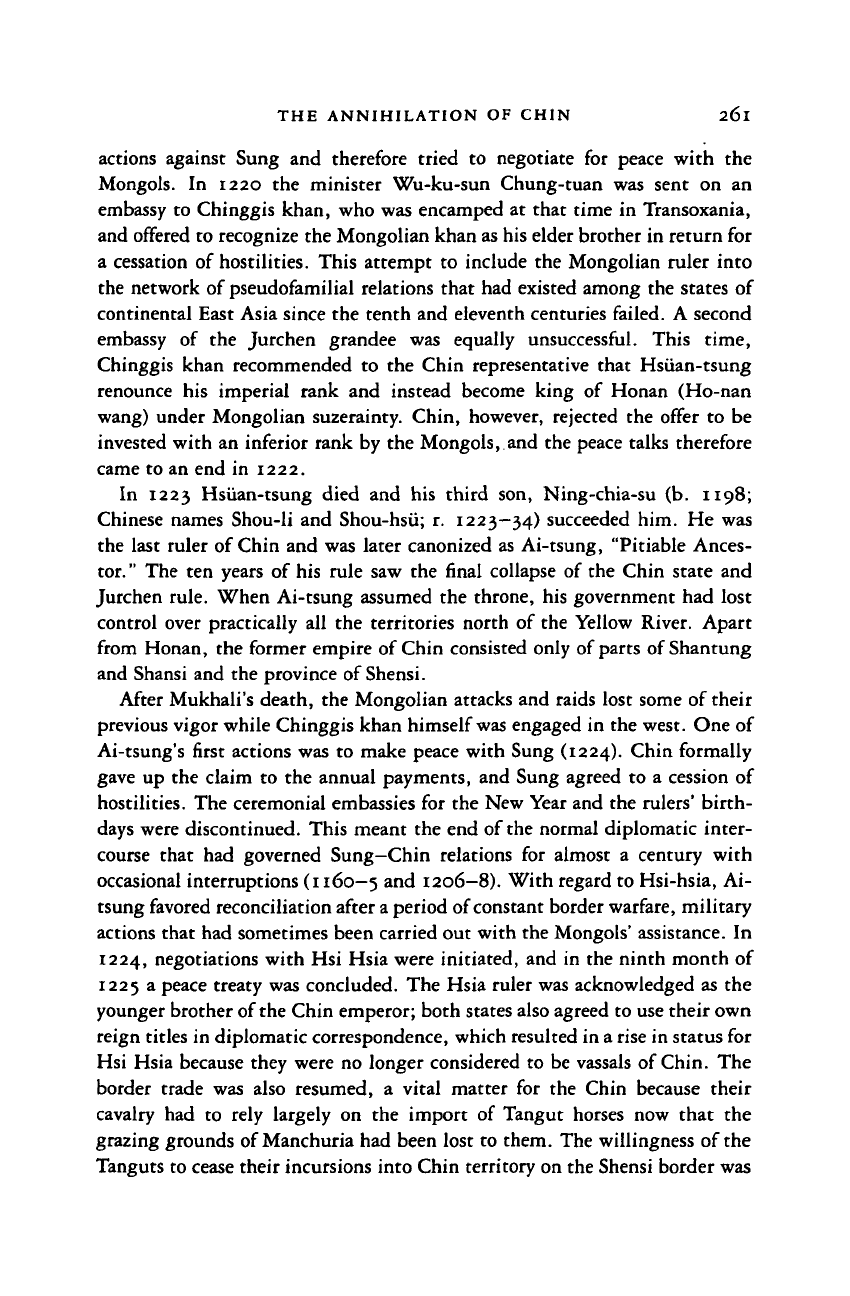
THE ANNIHILATION OF CHIN 261
actions against Sung and therefore tried to negotiate for peace with the
Mongols. In 1220 the minister Wu-ku-sun Chung-tuan was sent on an
embassy to Chinggis khan, who was encamped at that time in Transoxania,
and offered to recognize the Mongolian khan as his elder brother in return for
a cessation of hostilities. This attempt to include the Mongolian ruler into
the network of pseudofamilial relations that had existed among the states of
continental East Asia since the tenth and eleventh centuries failed. A second
embassy of the Jurchen grandee was equally unsuccessful. This time,
Chinggis khan recommended to the Chin representative that Hsiian-tsung
renounce his imperial rank and instead become king of Honan (Ho-nan
wang) under Mongolian suzerainty. Chin, however, rejected the offer to be
invested with an inferior rank by the Mongols, and the peace talks therefore
came to an end in 1222.
In 1223 Hsiian-tsung died and his third son, Ning-chia-su (b. 1198;
Chinese names Shou-li and Shou-hsii; r. 1223-34) succeeded him. He was
the last ruler of Chin and was later canonized as Ai-tsung, "Pitiable Ances-
tor.
"
The ten years of his rule saw the final collapse of the Chin state and
Jurchen rule. When Ai-tsung assumed the throne, his government had lost
control over practically all the territories north of the Yellow River. Apart
from Honan, the former empire of Chin consisted only of parts of Shantung
and Shansi and the province of Shensi.
After Mukhali's death, the Mongolian attacks and raids lost some of their
previous vigor while Chinggis khan himself
was
engaged in the west. One of
Ai-tsung's first actions was to make peace with Sung (1224). Chin formally
gave up the claim to the annual payments, and Sung agreed to a cession of
hostilities. The ceremonial embassies for the New Year and the rulers' birth-
days were discontinued. This meant the end of the normal diplomatic inter-
course that had governed Sung-Chin relations for almost a century with
occasional interruptions (1160-5
an
d 1206-8). With regard to Hsi-hsia, Ai-
tsung favored reconciliation after
a
period of constant border warfare, military
actions that had sometimes been carried out with the Mongols' assistance. In
1224,
negotiations with Hsi Hsia were initiated, and in the ninth month of
1225 a peace treaty was concluded. The Hsia ruler was acknowledged as the
younger brother of
the
Chin emperor; both states also agreed to use their own
reign titles in diplomatic correspondence, which resulted in a rise in status for
Hsi Hsia because they were no longer considered to be vassals of Chin. The
border trade was also resumed, a vital matter for the Chin because their
cavalry had to rely largely on the import of Tangut horses now that the
grazing grounds of Manchuria had been lost to them. The willingness of the
Tanguts to cease their incursions into Chin territory on the Shensi border was
Cambridge Histories Online © Cambridge University Press, 2008
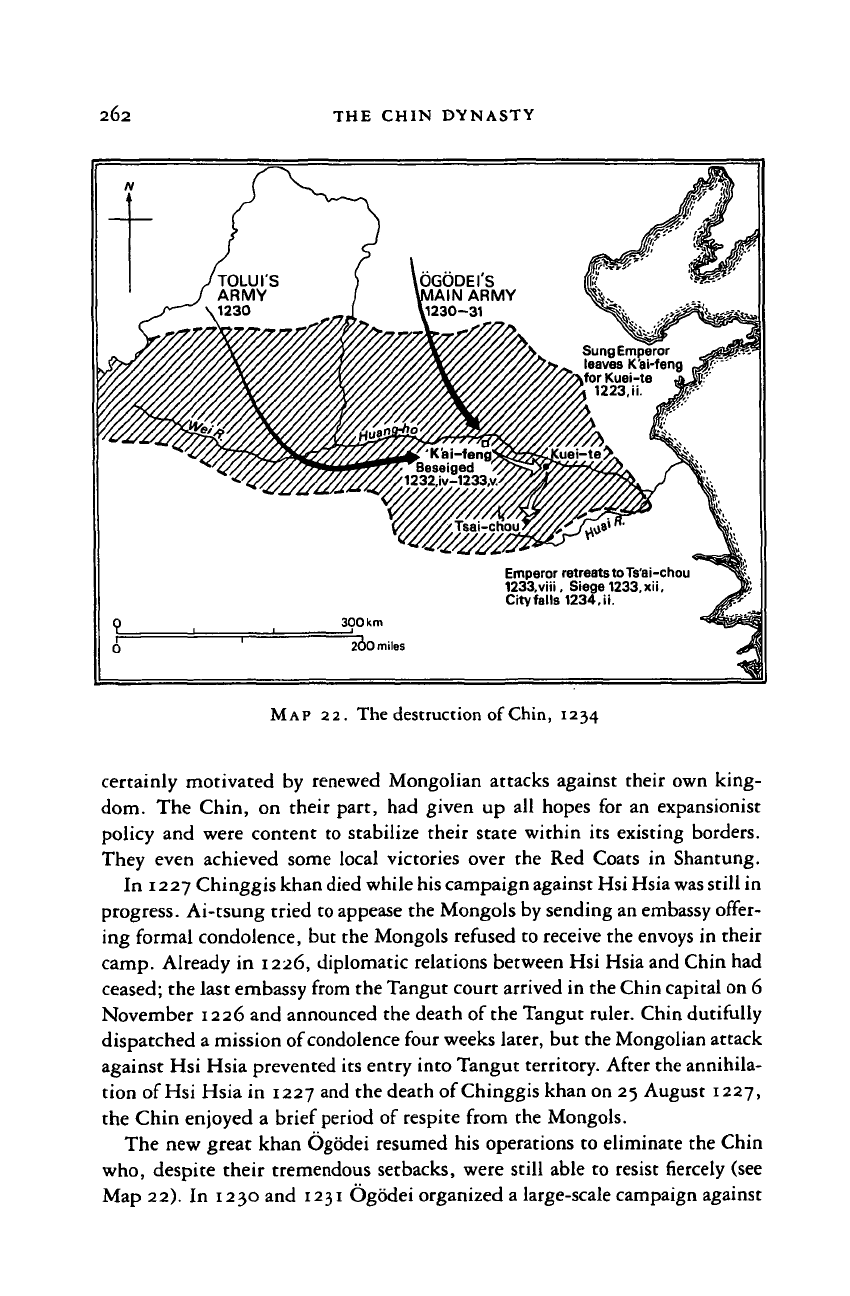
262
THE CHIN DYNASTY
OGODEIS
AIN
ARMY
1230-31
TOLUI'S
ARMY
1230
Sung
Emperor
leaves
K'ai-feng
for Kuei-te
1223,ii.
Emperor
retreats to
Ts'ai-chou
1233,viii,
Siege 1233,xii.
City
falls
1234, ii.
MAP
22.
The destruction
of
Chin,
1234
certainly motivated
by
renewed Mongolian attacks against their own king-
dom.
The
Chin,
on
their part,
had
given
up all
hopes
for an
expansionist
policy
and
were content
to
stabilize their state within
its
existing borders.
They even achieved some local victories over
the Red
Coats
in
Shantung.
In 1227 Chinggis khan died while his campaign against Hsi Hsia
was
still in
progress. Ai-tsung tried
to
appease the Mongols by sending an embassy offer-
ing formal condolence, but the Mongols refused to receive the envoys
in
their
camp.
Already
in
1226, diplomatic relations between Hsi Hsia and Chin had
ceased; the last embassy from the Tangut court arrived in the Chin capital on 6
November 1226 and announced the death of the Tangut ruler. Chin dutifully
dispatched a mission of condolence four weeks later, but the Mongolian attack
against Hsi Hsia prevented its entry into Tangut territory. After the annihila-
tion of Hsi Hsia
in
1227 and the death of Chinggis khan on 25 August 1227,
the Chin enjoyed
a
brief period
of
respite from the Mongols.
The new great khan Ogodei resumed his operations to eliminate the Chin
who,
despite their tremendous setbacks, were still able
to
resist
fiercely
(see
Map 22).
In
1230 and 1231 Ogodei organized a large-scale campaign against
Cambridge Histories Online © Cambridge University Press, 2008
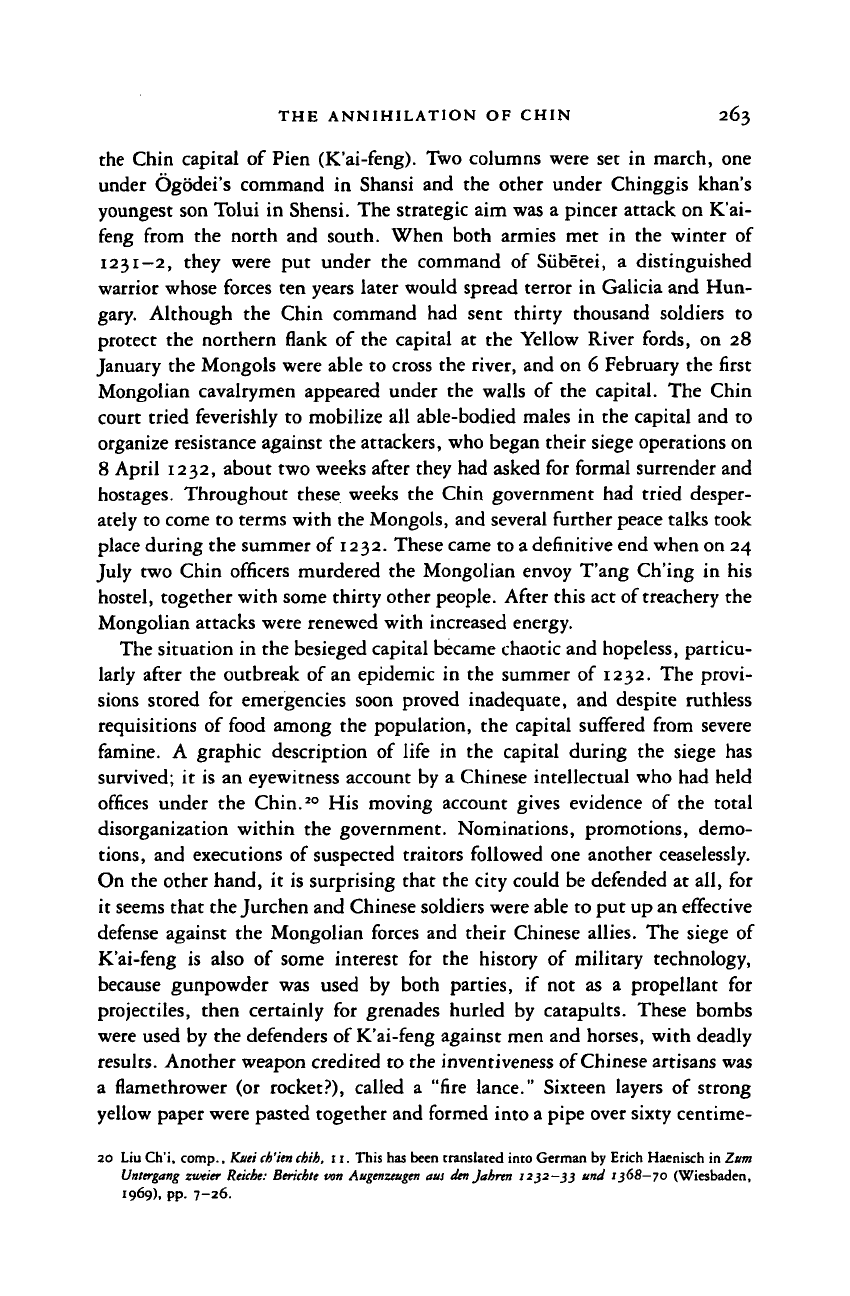
THE ANNIHILATION OF CHIN 263
the Chin capital of Pien (K'ai-feng). Two columns were set in march, one
under Ogodei's command in Shansi and the other under Chinggis khan's
youngest son Tolui in Shensi. The strategic aim was a pincer attack on K'ai-
feng from the north and south. When both armies met in the winter of
1231-2,
they were put under the command of Siibetei, a distinguished
warrior whose forces ten years later would spread terror in Galicia and Hun-
gary. Although the Chin command had sent thirty thousand soldiers to
protect the northern flank of the capital at the Yellow River fords, on 28
January the Mongols were able to cross the river, and on 6 February the first
Mongolian cavalrymen appeared under the walls of the capital. The Chin
court tried feverishly to mobilize all able-bodied males in the capital and to
organize resistance against the attackers, who began their siege operations on
8 April 1232, about two weeks after they had asked for formal surrender and
hostages. Throughout these weeks the Chin government had tried desper-
ately to come to terms with the Mongols, and several further peace talks took
place during the summer of 1232. These came to a definitive end when on 24
July two Chin officers murdered the Mongolian envoy T'ang Ch'ing in his
hostel, together with some thirty other people. After this act of treachery the
Mongolian attacks were renewed with increased energy.
The situation in the besieged capital became chaotic and hopeless, particu-
larly after the outbreak of an epidemic in the summer of 1232. The provi-
sions stored for emergencies soon proved inadequate, and despite ruthless
requisitions of food among the population, the capital suffered from severe
famine. A graphic description of life in the capital during the siege has
survived; it is an eyewitness account by a Chinese intellectual who had held
offices under the Chin.
20
His moving account gives evidence of the total
disorganization within the government. Nominations, promotions, demo-
tions,
and executions of suspected traitors followed one another ceaselessly.
On the other hand, it is surprising that the city could be defended at all, for
it seems that the Jurchen and Chinese soldiers were able to put up an effective
defense against the Mongolian forces and their Chinese allies. The siege of
K'ai-feng is also of some interest for the history of military technology,
because gunpowder was used by both parties, if not as a propellant for
projectiles, then certainly for grenades hurled by catapults. These bombs
were used by the defenders of K'ai-feng against men and horses, with deadly
results. Another weapon credited to the inventiveness of Chinese artisans was
a flamethrower (or rocket?), called a "fire lance." Sixteen layers of strong
yellow paper were pasted together and formed into a pipe over sixty centime-
20 Liu Ch'i, comp., Kuei
ch'ien
chih, 11. This has been translated into German by Erich Haenisch in Zum
Untergattg zweier Rticht: Berichit von Augenztugtn am dm Jahrtn 1232—33 und 1368-70 (Wiesbaden,
•969).
PP- 7-26.
Cambridge Histories Online © Cambridge University Press, 2008
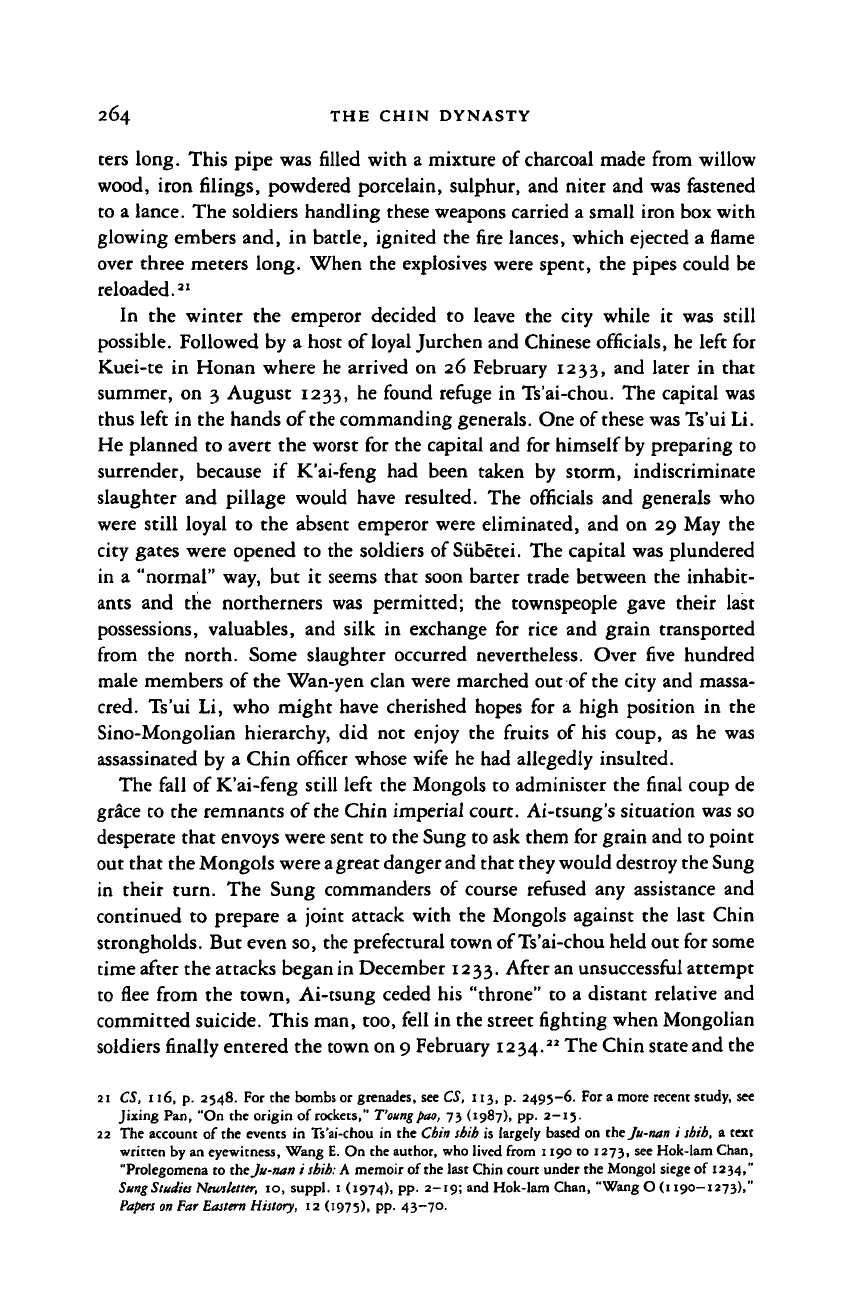
264 THE CHIN DYNASTY
ters long. This pipe was filled with a mixture of charcoal made from willow
wood, iron filings, powdered porcelain, sulphur, and niter and was fastened
to a lance. The soldiers handling these weapons carried a small iron box with
glowing embers and, in battle, ignited the fire lances, which ejected a flame
over three meters long. When the explosives were spent, the pipes could be
reloaded."
In the winter the emperor decided to leave the city while it was still
possible. Followed by a host of
loyal
Jurchen and Chinese officials, he left for
Kuei-te in Honan where he arrived on 26 February 1233, and later in that
summer, on 3 August 1233, he found refuge in Ts'ai-chou. The capital was
thus left in the hands of the commanding generals. One of
these
was Ts'ui Li.
He planned to avert the worst for the capital and for himself
by
preparing to
surrender, because if K'ai-feng had been taken by storm, indiscriminate
slaughter and pillage would have resulted. The officials and generals who
were still loyal to the absent emperor were eliminated, and on 29 May the
city gates were opened to the soldiers of
Subetei.
The capital was plundered
in a "normal" way, but it seems that soon barter trade between the inhabit-
ants and the northerners was permitted; the townspeople gave their last
possessions, valuables, and silk in exchange for rice and grain transported
from the north. Some slaughter occurred nevertheless. Over five hundred
male members of the Wan-yen clan were marched out of the city and massa-
cred. Ts'ui Li, who might have cherished hopes for a high position in the
Sino-Mongolian hierarchy, did not enjoy the fruits of his coup, as he was
assassinated by a Chin officer whose wife he had allegedly insulted.
The fall of K'ai-feng still left the Mongols to administer the final coup de
grace to the remnants of
the
Chin imperial court. Ai-tsung's situation was so
desperate that envoys were sent to the Sung to ask them for grain and to point
out that the Mongols were a great danger and that they would destroy the Sung
in their turn. The Sung commanders of course refused any assistance and
continued to prepare a joint attack with the Mongols against the last Chin
strongholds. But even so, the prefectural town of Ts'ai-chou held out for some
time after the attacks began in December 1233. After an unsuccessful attempt
to flee from the town, Ai-tsung ceded his "throne" to a distant relative and
committed suicide. This man, too, fell in the street fighting when Mongolian
soldiers
finally
entered the town on 9 February 1234." The Chin state and the
21 CS, 116, p. 2548. For the bombs or grenades, see CS, 113, p. 2495-6. For a more recent study, see
Jixing Pan, "On the origin of rockets," Toungpao, 73 (1987), pp. 2-15.
22 The account of the events in Ts'ai-chou in the Chin sbib is largely based on the Ju-nan i sbib, a text
written by an eyewitness, Wang E. On the author, who lived from 1190 to 1273, see Hok-lam Chan,
"Prolegomena to the Ju-nan i sbib: A memoir of the last Chin court under the Mongol siege of 1234,"
Sung Studies
Newsletter,
10, suppl. 1 (1974), pp. 2-19; and Hok-lam Chan, "Wang 0(1190-1273),"
Papers
an Far
Eastern
History, 12 (1975), pp. 43-70.
Cambridge Histories Online © Cambridge University Press, 2008
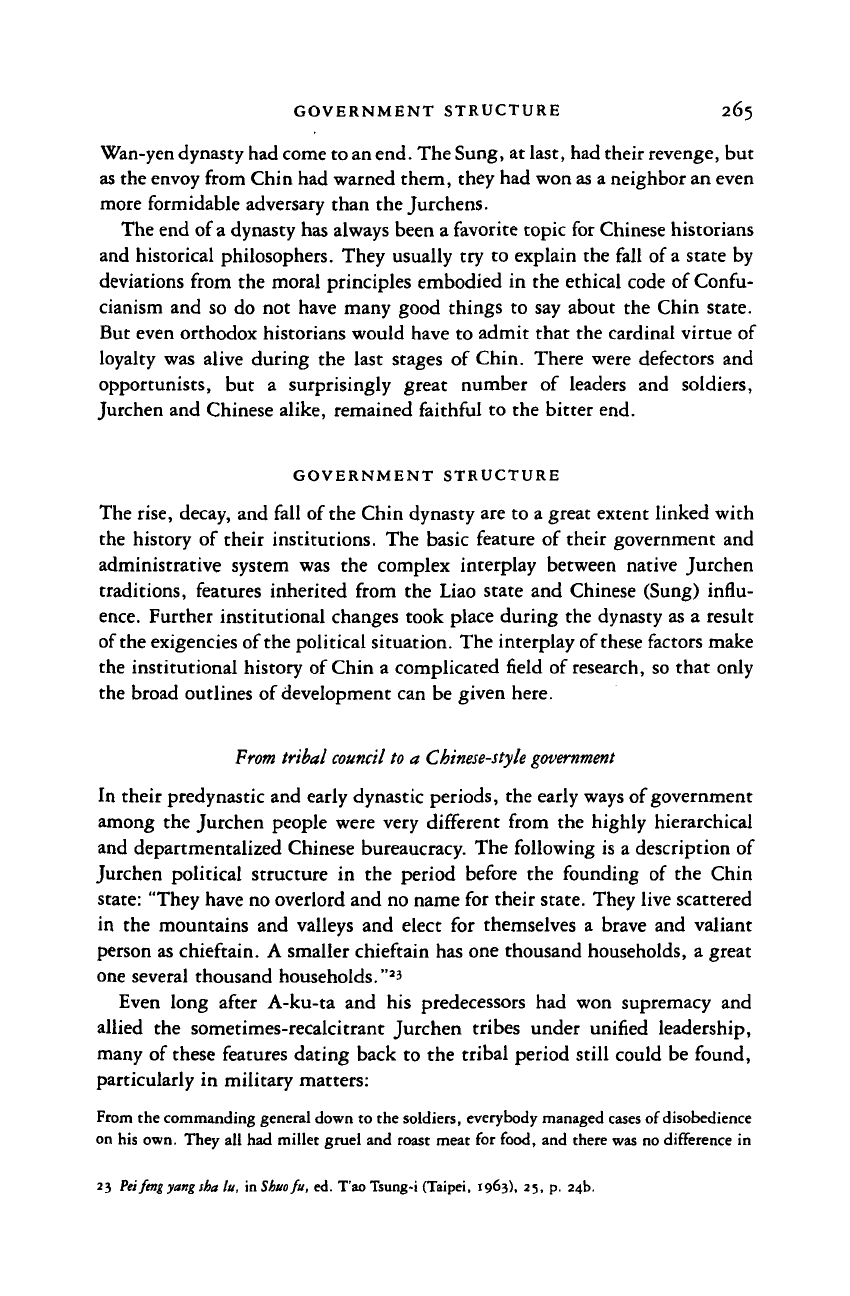
GOVERNMENT STRUCTURE 265
Wan-yen dynasty had come to an
end.
The Sung, at last, had their
revenge,
but
as
the envoy from Chin had warned them, they had won
as
a neighbor an even
more formidable adversary than the Jurchens.
The end of a dynasty has always been a favorite topic for Chinese historians
and historical philosophers. They usually
try to
explain the fall of
a
state
by
deviations from the moral principles embodied
in
the ethical code of Confu-
cianism
and so do not
have many good things
to say
about
the
Chin state.
But even orthodox historians would have
to
admit that the cardinal virtue of
loyalty
was
alive during
the
last stages
of
Chin. There were defectors
and
opportunists,
but a
surprisingly great number
of
leaders
and
soldiers,
Jurchen and Chinese alike, remained faithful
to
the bitter end.
GOVERNMENT STRUCTURE
The rise, decay, and fall of the Chin dynasty are
to
a great extent linked with
the history
of
their institutions.
The
basic feature
of
their government
and
administrative system
was the
complex interplay between native Jurchen
traditions, features inherited from
the
Liao state
and
Chinese (Sung) influ-
ence.
Further institutional changes took place during the dynasty as
a
result
of the exigencies of the political situation. The interplay of these factors make
the institutional history of Chin
a
complicated field
of
research, so that only
the broad outlines of development can be given here.
From tribal council to a Chinese-style government
In their predynastic and early dynastic periods, the early ways of government
among the Jurchen people were very different from
the
highly hierarchical
and departmentalized Chinese bureaucracy. The following
is
a description of
Jurchen political structure
in the
period before
the
founding
of the
Chin
state:
"They have no overlord and no name
for
their state. They live scattered
in
the
mountains
and
valleys
and
elect
for
themselves
a
brave
and
valiant
person as chieftain. A smaller chieftain has one thousand households, a great
one several thousand households."
23
Even long after A-ku-ta
and his
predecessors
had won
supremacy
and
allied
the
sometimes-recalcitrant Jurchen tribes under unified leadership,
many
of
these features dating back
to the
tribal period still could
be
found,
particularly
in
military matters:
From the commanding general down
to
the soldiers, everybody managed cases of disobedience
on
his
own. They
all
had millet gruel
and
roast meat
for
food,
and
there was
no
difference
in
23 Peifengyangshalu, in
Shuofu,
ed.
T'aoTsung-i (Taipei, 1963),
25, p. 24b.
Cambridge Histories Online © Cambridge University Press, 2008
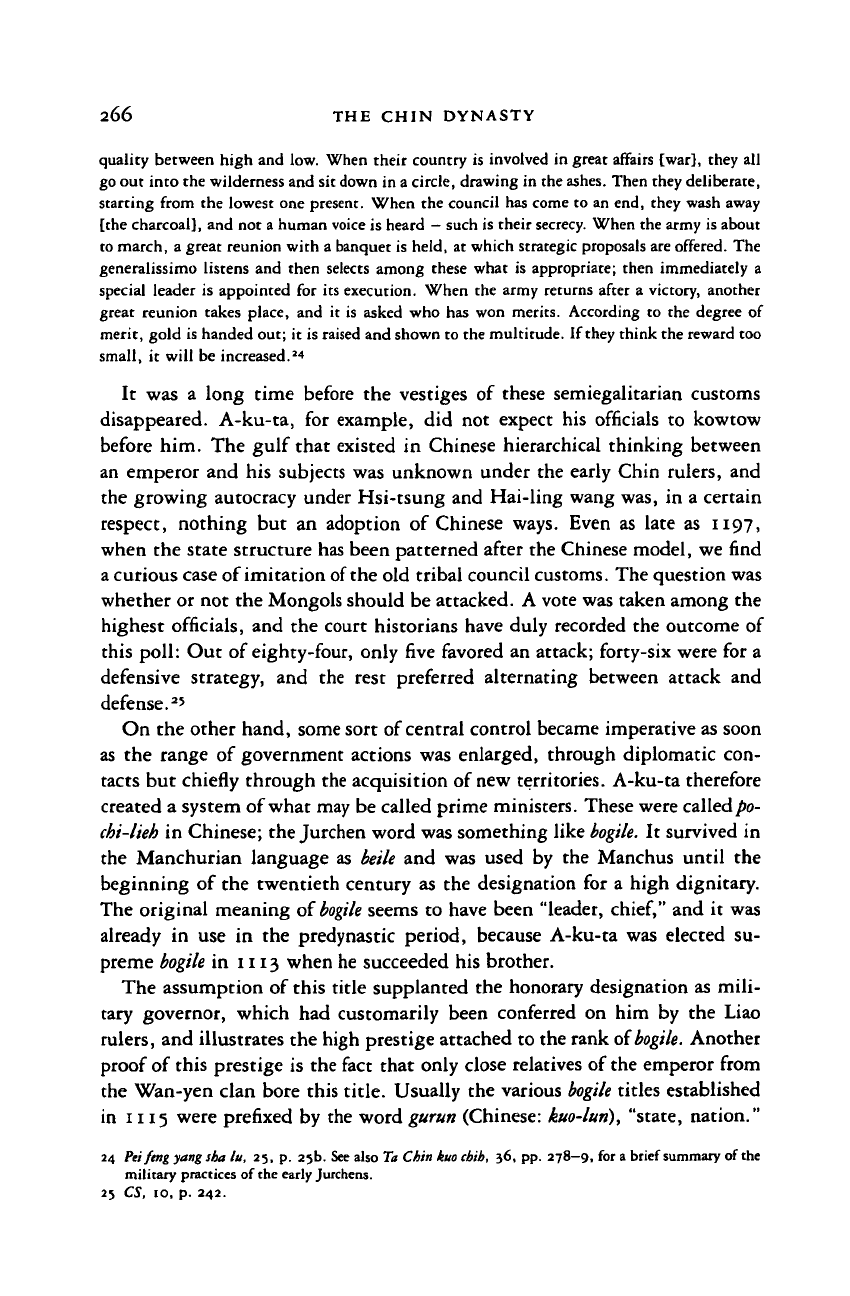
266 THE CHIN DYNASTY
quality between high and low. When their country is involved in great affairs [war], they all
go out into the wilderness and sit down in a circle, drawing in the ashes. Then they deliberate,
starting from the lowest one present. When the council has come to an end, they wash away
[the charcoal], and not a human voice is heard - such is their secrecy. When the army is about
to march, a great reunion with a banquet is held, at which strategic proposals are offered. The
generalissimo listens and then selects among these what is appropriate; then immediately a
special leader is appointed for its execution. When the army returns after a victory, another
great reunion takes place, and it is asked who has won merits. According to the degree of
merit, gold is handed out; it is raised and shown to the multitude. If they think the reward too
small, it will be increased.
24
It was a long time before the vestiges of these semiegalitarian customs
disappeared. A-ku-ta, for example, did not expect his officials to kowtow
before him. The gulf that existed in Chinese hierarchical thinking between
an emperor and his subjects was unknown under the early Chin rulers, and
the growing autocracy under Hsi-tsung and Hai-ling wang was, in a certain
respect, nothing but an adoption of Chinese ways. Even as late as 1197,
when the state structure has been patterned after the Chinese model, we find
a curious case of imitation of
the
old tribal council customs. The question was
whether or not the Mongols should be attacked. A vote was taken among the
highest officials, and the court historians have duly recorded the outcome of
this poll: Out of eighty-four, only five favored an attack; forty-six were for a
defensive strategy, and the rest preferred alternating between attack and
defense.
2
'
On the other hand, some sort of central control became imperative as soon
as the range of government actions was enlarged, through diplomatic con-
tacts but chiefly through the acquisition of new territories. A-ku-ta therefore
created a system of what may be called prime ministers. These were called
po-
chi-lieh
in Chinese; the Jurchen word was something like
bogile.
It survived in
the Manchurian language as
beile
and was used by the Manchus until the
beginning of the twentieth century as the designation for a high dignitary.
The original meaning of
bogile
seems to have been "leader,
chief,"
and it was
already in use in the predynastic period, because A-ku-ta was elected su-
preme
bogile
in 1113 when he succeeded his brother.
The assumption of this title supplanted the honorary designation as mili-
tary governor, which had customarily been conferred on him by the Liao
rulers,
and illustrates the high prestige attached to the rank of
bogile.
Another
proof of this prestige is the fact that only close relatives of the emperor from
the Wan-yen clan bore this title. Usually the various
bogile
titles established
in 1115 were prefixed by the word
gurun
(Chinese:
kuo-lun),
"state, nation."
24 Pa fmg yang sha lu, 25, p. 25b. Sec also Ta Chin kuo cbib, 36, pp. 278-9, for a brief summary of the
military practices of the early Jurchens.
25 CS, 10, p. 242.
Cambridge Histories Online © Cambridge University Press, 2008
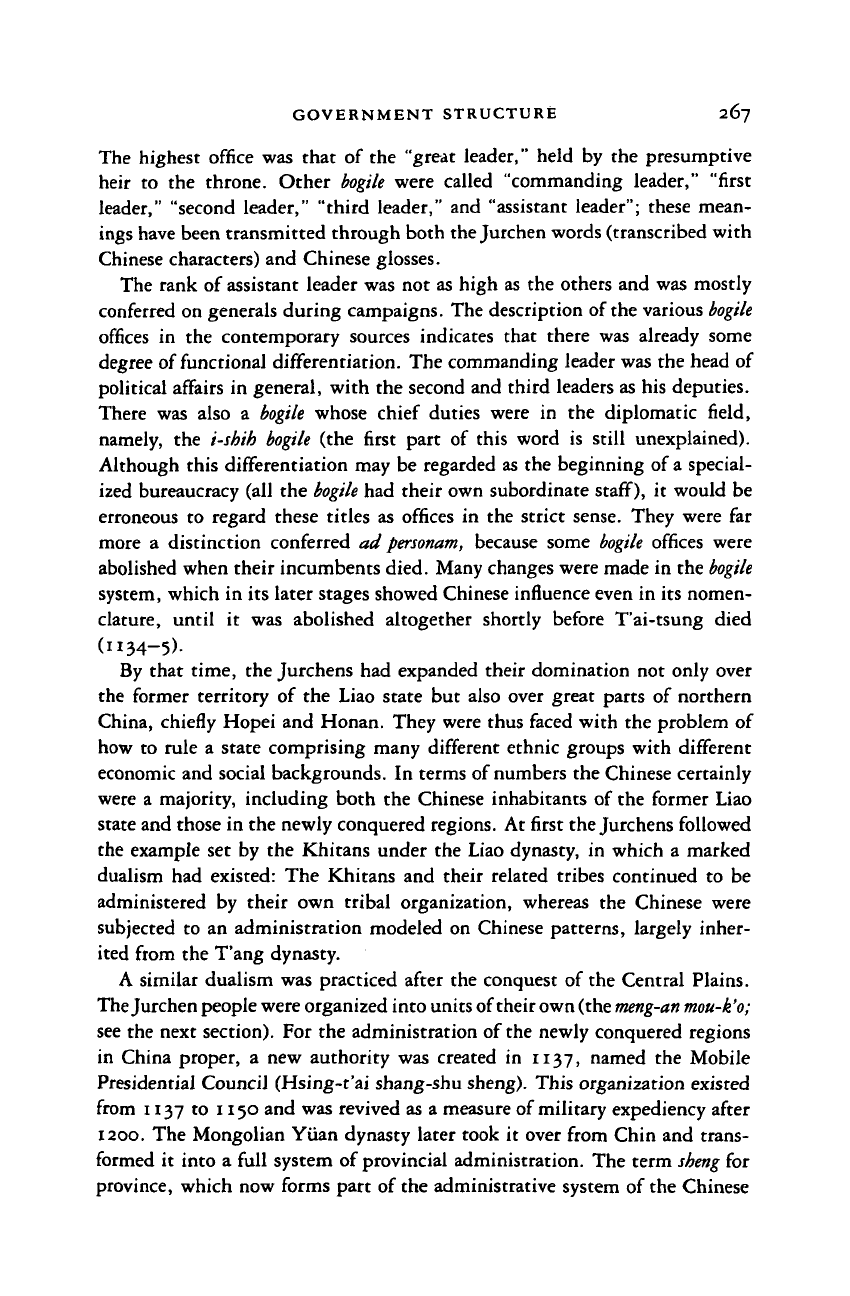
GOVERNMENT STRUCTURE 267
The highest office was that of the "great leader," held by the presumptive
heir to the throne. Other
bogile
were called "commanding leader," "first
leader," "second leader," "third leader," and "assistant leader"; these mean-
ings have been transmitted through both the Jurchen words (transcribed with
Chinese characters) and Chinese glosses.
The rank of assistant leader was not as high as the others and was mostly
conferred on generals during campaigns. The description of the various
bogile
offices in the contemporary sources indicates that there was already some
degree of functional differentiation. The commanding leader was the head of
political affairs in general, with the second and third leaders as his deputies.
There was also a
bogile
whose chief duties were in the diplomatic field,
namely, the
i-shih
bogile
(the first part of this word is still unexplained).
Although this differentiation may be regarded as the beginning of
a
special-
ized bureaucracy (all the
bogile
had their own subordinate staff), it would be
erroneous to regard these titles as offices in the strict sense. They were far
more a distinction conferred ad
personam,
because some
bogile
offices were
abolished when their incumbents died. Many changes were made in the
bogile
system, which in its later stages showed Chinese influence even in its nomen-
clature, until it was abolished altogether shortly before T'ai-tsung died
("34-5)-
By that time, the Jurchens had expanded their domination not only over
the former territory of the Liao state but also over great parts of northern
China, chiefly Hopei and Honan. They were thus faced with the problem of
how to rule a state comprising many different ethnic groups with different
economic and social backgrounds. In terms of numbers the Chinese certainly
were a majority, including both the Chinese inhabitants of the former Liao
state and those in the newly conquered regions. At first
the
Jurchens followed
the example set by the Khitans under the Liao dynasty, in which a marked
dualism had existed: The Khitans and their related tribes continued to be
administered by their own tribal organization, whereas the Chinese were
subjected to an administration modeled on Chinese patterns, largely inher-
ited from the T'ang dynasty.
A similar dualism was practiced after the conquest of the Central Plains.
The Jurchen people were organized into units of their
own
(the
meng-an
mou-k'o;
see the next section). For the administration of the newly conquered regions
in China proper, a new authority was created in 1137, named the Mobile
Presidential Council (Hsing-t'ai shang-shu
sheng).
This organization existed
from n
37
to 1150 and was revived as a measure of military expediency after
1200.
The Mongolian Yuan dynasty later took it over from Chin and trans-
formed it into a full system of provincial administration. The term
sheng
for
province, which now forms part of the administrative system of the Chinese
Cambridge Histories Online © Cambridge University Press, 2008
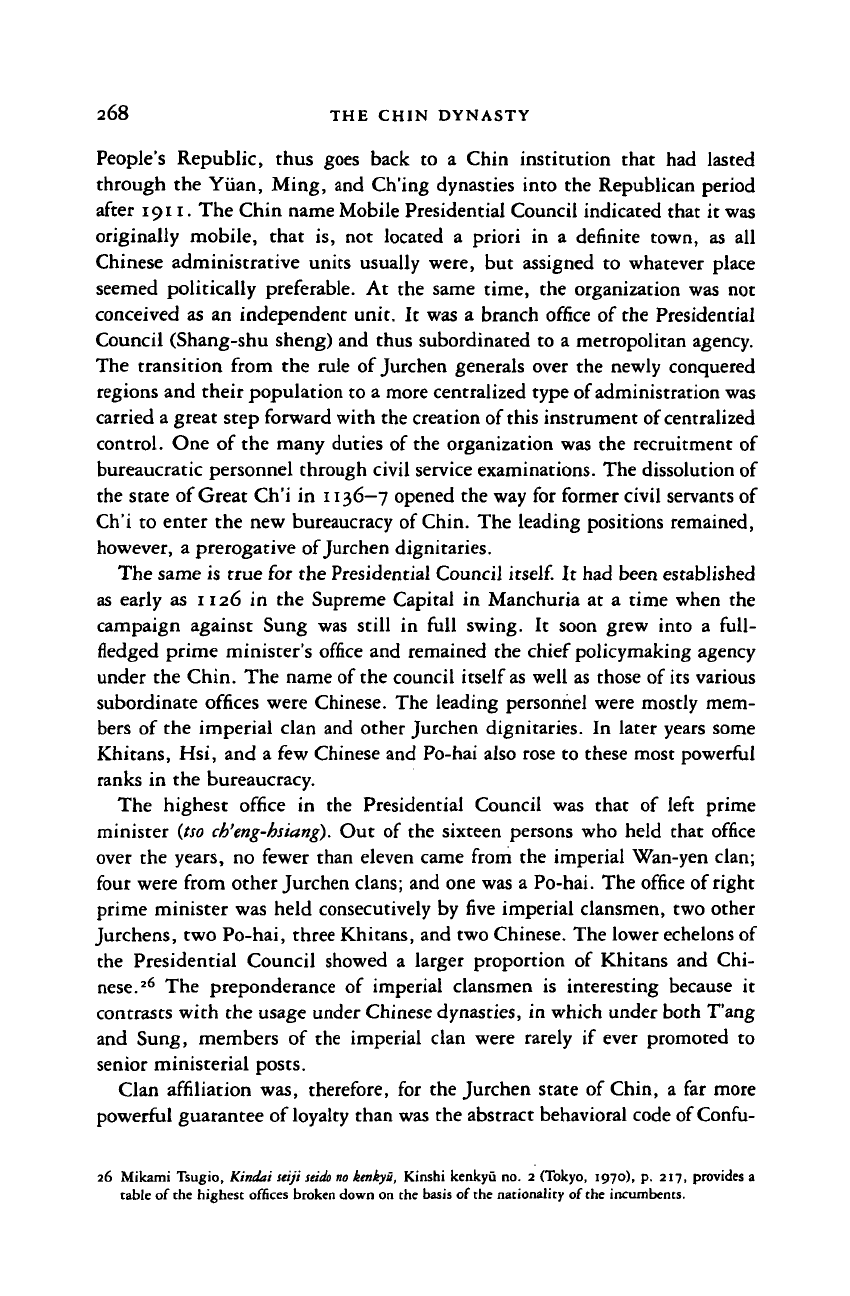
268 THE CHIN DYNASTY
People's Republic, thus goes back to a Chin institution that had lasted
through the Yuan, Ming, and Ch'ing dynasties into the Republican period
after 1911. The Chin name Mobile Presidential Council indicated that it was
originally mobile, that is, not located a priori in a definite town, as all
Chinese administrative units usually were, but assigned to whatever place
seemed politically preferable. At the same time, the organization was not
conceived as an independent unit. It was a branch office of the Presidential
Council (Shang-shu sheng) and thus subordinated to a metropolitan agency.
The transition from the rule of Jurchen generals over the newly conquered
regions and their population to a more centralized type of administration was
carried a great step forward with the creation of this instrument of centralized
control. One of the many duties of the organization was the recruitment of
bureaucratic personnel through civil service examinations. The dissolution of
the state of Great Ch'i in 1136—7 opened the way for former civil servants of
Ch'i to enter the new bureaucracy of Chin. The leading positions remained,
however, a prerogative of Jurchen dignitaries.
The same is true for the Presidential Council
itself.
It had been established
as early as 1126 in the Supreme Capital in Manchuria at a time when the
campaign against Sung was still in full swing. It soon grew into a full-
fledged prime minister's office and remained the chief policymaking agency
under the Chin. The name of the council itself
as
well as those of its various
subordinate offices were Chinese. The leading personnel were mostly mem-
bers of the imperial clan and other Jurchen dignitaries. In later years some
Khitans, Hsi, and a few Chinese and Po-hai also rose to these most powerful
ranks in the bureaucracy.
The highest office in the Presidential Council was that of left prime
minister
(tso
ch'eng-hsiang).
Out of the sixteen persons who held that office
over the years, no fewer than eleven came from the imperial Wan-yen clan;
four were from other Jurchen clans; and one was a Po-hai. The office of right
prime minister was held consecutively by five imperial clansmen, two other
Jurchens, two Po-hai, three Khitans, and two Chinese. The lower echelons of
the Presidential Council showed a larger proportion of Khitans and Chi-
nese.
26
The preponderance of imperial clansmen is interesting because it
contrasts with the usage under Chinese dynasties, in which under both T'ang
and Sung, members of the imperial clan were rarely if ever promoted to
senior ministerial posts.
Clan affiliation was, therefore, for the Jurchen state of Chin, a far more
powerful guarantee of loyalty than was the abstract behavioral code of Confu-
26 Mikami Tsugio, Kindai uiji
seido no
kenkyu, Kinshi kenkyu no. 2 (Tokyo, 1970), p. 217, provides a
table of the highest offices broken down on the basis of the nationality of the incumbents.
Cambridge Histories Online © Cambridge University Press, 2008
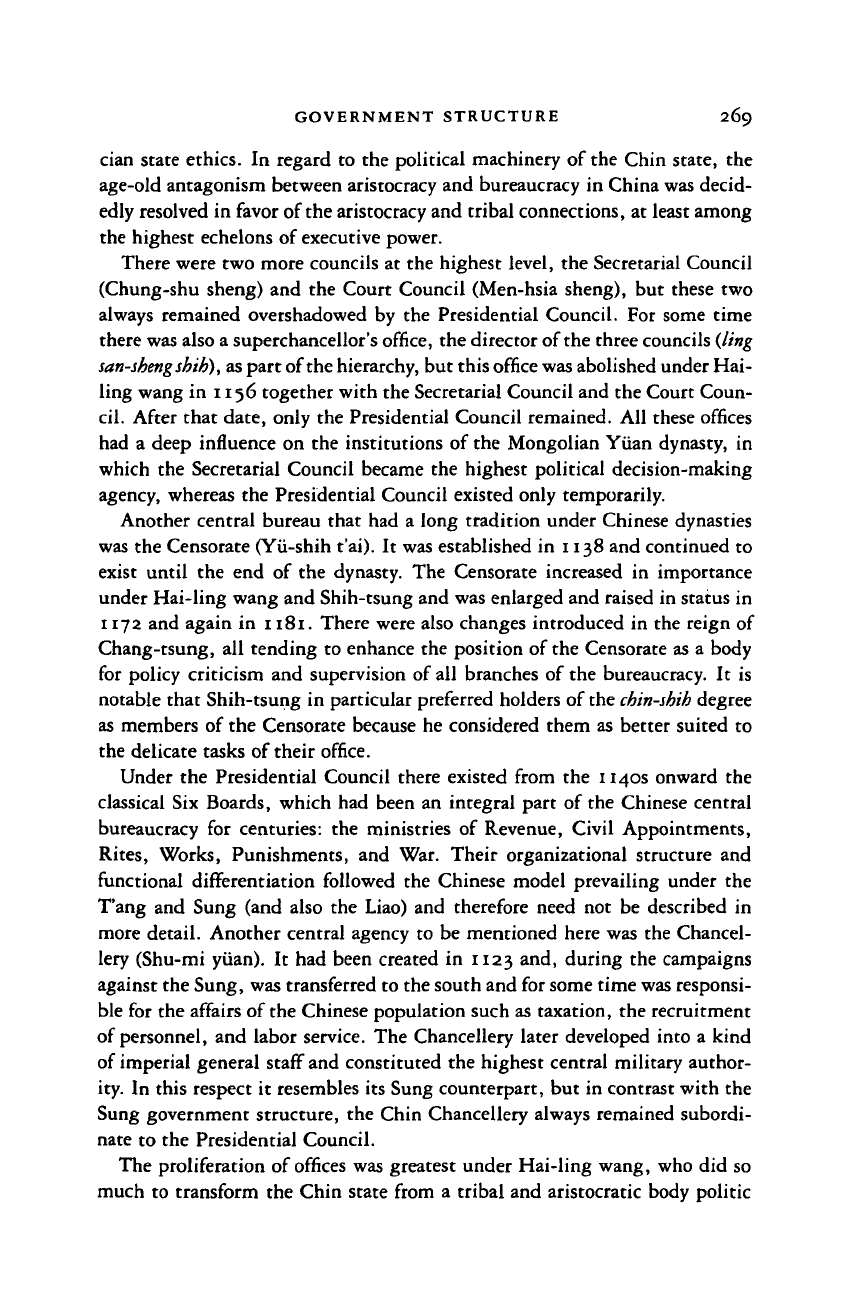
GOVERNMENT STRUCTURE 269
cian state ethics. In regard to the political machinery of the Chin state, the
age-old antagonism between aristocracy and bureaucracy in China was decid-
edly resolved in favor of the aristocracy and tribal connections, at least among
the highest echelons of executive power.
There were two more councils at the highest level, the Secretarial Council
(Chung-shu sheng) and the Court Council (Men-hsia sheng), but these two
always remained overshadowed by the Presidential Council. For some time
there was also a superchancellor's office, the director of the three councils {ling
san-shengshih), as part of the hierarchy, but this office was abolished under Hai-
ling wang in 1156 together with the Secretarial Council and the Court Coun-
cil.
After that date, only the Presidential Council remained. All these offices
had a deep influence on the institutions of the Mongolian Yuan dynasty, in
which the Secretarial Council became the highest political decision-making
agency, whereas the Presidential Council existed only temporarily.
Another central bureau that had a long tradition under Chinese dynasties
was the Censorate (Yii-shih t'ai). It was established in 1138 and continued to
exist until the end of the dynasty. The Censorate increased in importance
under Hai-ling wang and Shih-tsung and was enlarged and raised in status in
1172 and again in 1181. There were also changes introduced in the reign of
Chang-tsung, all tending to enhance the position of the Censorate as a body
for policy criticism and supervision of all branches of the bureaucracy. It is
notable that Shih-tsung in particular preferred holders of the
chin-shih
degree
as members of the Censorate because he considered them as better suited to
the delicate tasks of their office.
Under the Presidential Council there existed from the 1140s onward the
classical Six Boards, which had been an integral part of the Chinese central
bureaucracy for centuries: the ministries of Revenue, Civil Appointments,
Rites,
Works, Punishments, and War. Their organizational structure and
functional differentiation followed the Chinese model prevailing under the
T'ang and Sung (and also the Liao) and therefore need not be described in
more detail. Another central agency to be mentioned here was the Chancel-
lery (Shu-mi yuan). It had been created in 1123 and, during the campaigns
against the Sung, was transferred to the south and for some time was responsi-
ble for the affairs of the Chinese population such as taxation, the recruitment
of personnel, and labor service. The Chancellery later developed into a kind
of imperial general staff and constituted the highest central military author-
ity. In this respect it resembles its Sung counterpart, but in contrast with the
Sung government structure, the Chin Chancellery always remained subordi-
nate to the Presidential Council.
The proliferation of offices was greatest under Hai-ling wang, who did so
much to transform the Chin state from a tribal and aristocratic body politic
Cambridge Histories Online © Cambridge University Press, 2008
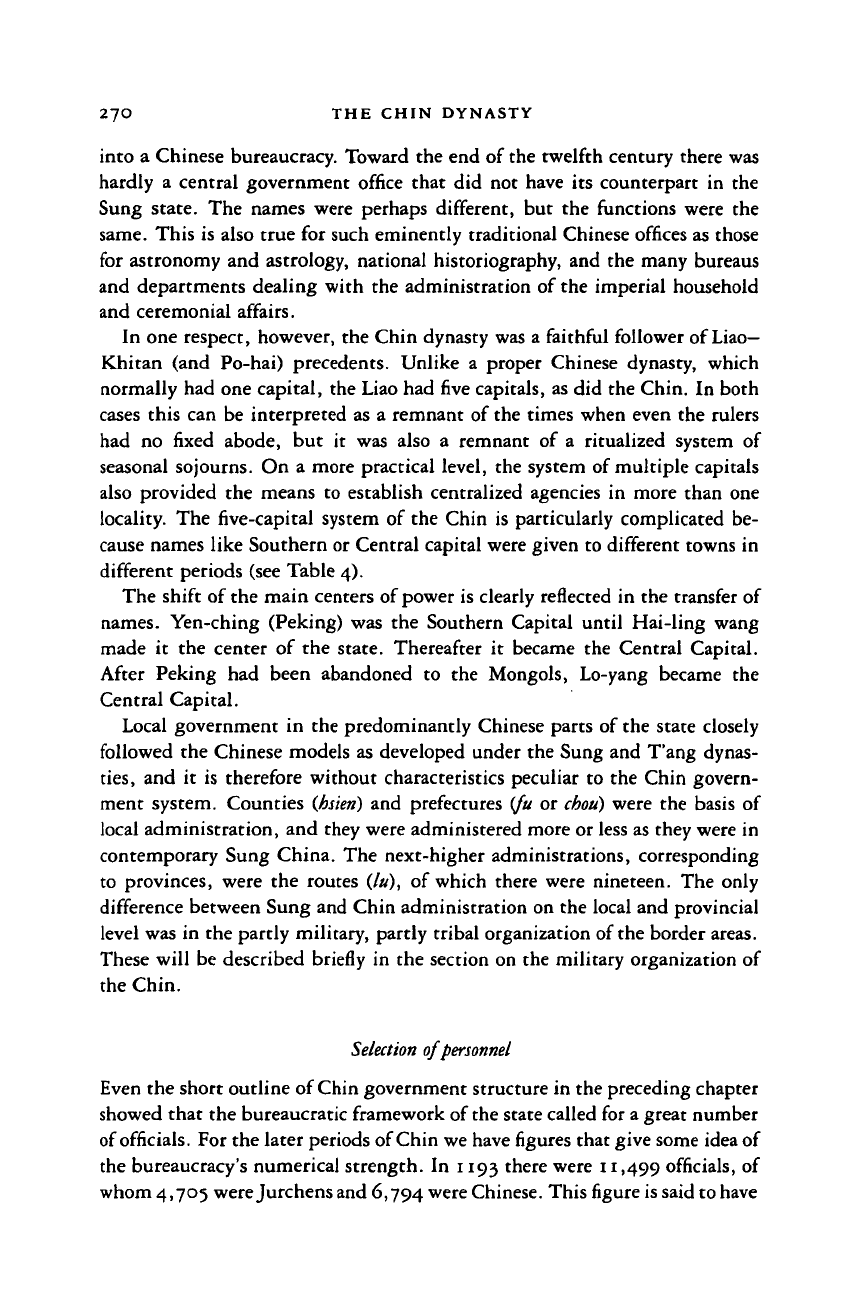
270 THE CHIN DYNASTY
into a Chinese bureaucracy. Toward the end of the twelfth century there was
hardly a central government office that did not have its counterpart in the
Sung state. The names were perhaps different, but the functions were the
same. This is also true for such eminently traditional Chinese offices as those
for astronomy and astrology, national historiography, and the many bureaus
and departments dealing with the administration of the imperial household
and ceremonial affairs.
In one respect, however, the Chin dynasty was a faithful follower of Liao-
Khitan (and Po-hai) precedents. Unlike a proper Chinese dynasty, which
normally had one capital, the Liao had five capitals, as did the Chin. In both
cases this can be interpreted as a remnant of the times when even the rulers
had no fixed abode, but it was also a remnant of a ritualized system of
seasonal sojourns. On a more practical level, the system of multiple capitals
also provided the means to establish centralized agencies in more than one
locality. The five-capital system of the Chin is particularly complicated be-
cause names like Southern or Central capital were given to different towns in
different periods (see Table 4).
The shift of the main centers of power is clearly reflected in the transfer of
names. Yen-ching (Peking) was the Southern Capital until Hai-ling wang
made it the center of the state. Thereafter it became the Central Capital.
After Peking had been abandoned to the Mongols, Lo-yang became the
Central Capital.
Local government in the predominantly Chinese parts of the state closely
followed the Chinese models as developed under the Sung and T'ang dynas-
ties,
and it is therefore without characteristics peculiar to the Chin govern-
ment system. Counties
(hsien)
and prefectures (fu or
chou)
were the basis of
local administration, and they were administered more or less as they were in
contemporary Sung China. The next-higher administrations, corresponding
to provinces, were the routes (/«), of which there were nineteen. The only
difference between Sung and Chin administration on the local and provincial
level was in the partly military, partly tribal organization of the border areas.
These will be described briefly in the section on the military organization of
the Chin.
Selection of personnel
Even the short outline of Chin government structure in the preceding chapter
showed that the bureaucratic framework of
the
state called for a great number
of officials. For the later periods of Chin we have
figures
that give some idea of
the bureaucracy's numerical strength. In 1193 there were 11,499 officials, of
whom 4,705 were Jurchens and 6,794
w
^re
Chinese.
This
figure
is said to have
Cambridge Histories Online © Cambridge University Press, 2008
